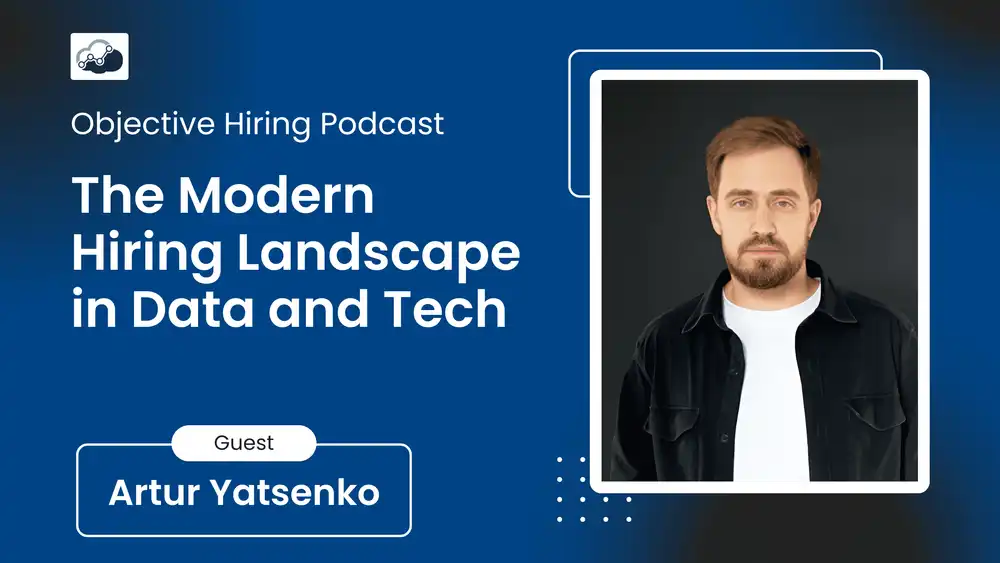Artur Yatsenko on AI, Automation and the Shift Towards Conscious Hiring in Data Roles

Artur Yatsenko on AI, Automation and the Shift Towards Conscious Hiring in Data Roles
In this episode of the Objective Hiring podcast, Tim Freestone, founder of Alooba, speaks with Artur Yatsenko, Director of Data Engineering at Urban Sports Club, about how hiring has changed in the face of AI, growing candidate volume, and budget constraints.
“Back in 2022 we had around 90 applications per job. In 2024, we have around 200.”
The End of Hypergrowth, the Rise of Conscious Hiring
Artur points out that the days of rushed hypergrowth are over. Hiring decisions are now more considered, with companies focusing on long-term value rather than speed.
“You really need to hire consciously and sustainably… maximise the effort and bring the best value to the company.”
This includes clearer upfront role definitions and structured interview processes to avoid hiring the wrong fit—something many companies failed to do during their rapid expansion phases.
“It’s more thoughtful than it used to be.”
Transparency as a Hiring Superpower
Artur believes transparency has become a non-negotiable expectation from candidates.
“What candidates really value is transparency… not just the stages but what they can expect in the job, how they can grow, what technology we use.”
His team now shares internal frameworks and tooling up front, helping candidates decide whether the role truly suits them. This aligns closely with Tim’s view that most job ads fail to deliver real insight—resulting in candidate drop-off or disengagement.
“A typical job ad is devoid of really anything. It’s just a bunch of tools and a generic description.”
Screening at Scale: AI’s Growing Role
With applications doubling, the screening process has become more time-intensive. Artur sometimes personally reviews over 100 CVs per role. He acknowledges that automation has become essential, particularly for screening.
“Even a couple of years back, the whole screening process… it's more automated now.”
That said, he cautions that automation can't replace human judgment entirely. The mindset, values, and communication style of a candidate are still best assessed by people.
“We as humans still want to have control… we don’t want to miss out on anything.”
AI in the Hands of Candidates
On the candidate side, Artur has seen applicants use tools like ChatGPT to write CVs—and he’s not against it.
“If you’re not using it, I don’t think you’re maximising your chances enough.”
What matters more to him is honesty. If someone claims an AI-generated response as their own original thinking, that’s a red flag.
“If there’s no trust created, you won’t be able to hire that person.”
His team has moved away from home take-home case studies (partly due to AI), favouring in-interview assessments that allow for real-time thinking and collaboration.
“Now we try to condense interviews into one day, covering technical skills, architecture, and collaboration.”
The Shift in Evaluation Criteria
One of the most important insights Artur shared is that his team no longer optimises purely for speed or raw skills—they optimise for process, candidate experience, and fairness.
“We look at acceptance rates, candidate satisfaction, how long each stage takes… and we make quarterly improvements.”
This kind of data-informed approach reflects the best of what Alooba offers—fair, structured, and measurable assessment experiences that replace subjective guesswork with objective evaluation. If you're looking to build a fairer hiring process, start assessing with Alooba.
Avoiding Regrettable Hires
Artur also explained that when hiring decisions were rushed, it often led to mismatched placements or internal reshuffling. But with conscious hiring, the risk of a bad hire drops.
“The skill set in terms of mindset is far more complicated to learn than technical skills… that’s what we’re hiring for.”
And if the wrong decision is made? With the right team structure and transparency, it’s easier to spot and fix.
“Even if I want to hire someone regardless, my colleagues would raise the red flags. It’s a team decision.”
AI Will Stay—but So Will Humans
Despite the rise of large language models and other AI tools, Artur believes that the future of hiring will still need a human touch.
“It will still be human… but definitely more AI will be used in the process.”
He predicts that hiring will continue to evolve alongside AI—but it will never be fully handed over to machines.
“We make mistakes as humans, but we also fight the decisions made by AI. That resistance will always be there.”
Final Thoughts
Hiring is changing fast. Candidates are using AI. Companies are automating more. But the best organisations are taking a step back and redesigning the process to be fairer, more data-driven, and more thoughtful.
As Artur says:
“It’s a constant learning… to adapt to the challenges of the market.”
If you're navigating a high volume of candidates and want to add structure and objectivity to your hiring funnel, Alooba can help. From CV screening to interview preparation, Alooba's platform is designed to make hiring easier, fairer, and more reliable.